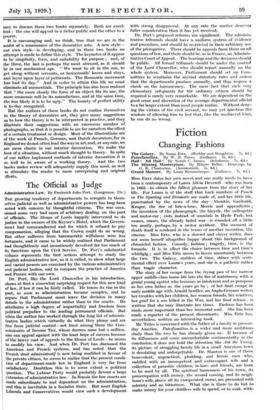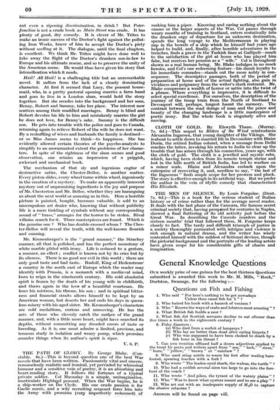Fiction
Changing Fashions
G. K. Chesterton. (Arrowsmith. '78. 6d.) Grand Manner. By Louis Kronenberger. (Gollancz. 7s. 6d.)
Miss Elm dates her own novel, and one really needs to have been a contemporary of Laura Alicia Deverell—who was born
in 1863—to obtain the fullest pleasure from the story of her life. For Laura is of the stuff that back numbers of Punch or The Sporting and Dramatic are made of, and her little life, punctuated by the news of the day—Aboukir, Garibaldi, Kruger, the rise of bric-a-brac, Morris and appendicitis ; the invention of the phonograph, the bicycle, the suffragette and motor-car ; riots instead of scandals in Hyde Park, lost causes, crazes, the already faded war—is rounded off a little too neatly, perhaps, by a motor accident. The moment of death itself is rendered in the terms of another invention, the cinema. Miss Ertz, who is a shrewd and clever writer, does not seem herself altogether happy about this background of chronicled fashion. Comedy, fashion ; tragedy, time, is the formula. It is in effect the choice between time and time's whirligig ; and Miss Ertz seems to hover uncertainly between the two. The Galaxy, emblem of time, shines with senti- mental effect over Laura's years, and she is a pathetic rather than tragic character.
The story of her escape from the frying pan of her narrow upper middle-class home life into the fire of matrimony with a genial young egotist who becomes as intolerant and as pompous as her own father as the years go by ; of her final escape in early middle age with Arnold Sendler, an Anglo-German writer; her troubles with her children, her women friends, her relatives, her grief for a son killed in the War, and her final release—is written that she may illustrate her times. Fashion has been made more important than her immortal soul. She has been made a reporter of the present discontents. Miss Ertz has, nevertheless, written an interesting book.
Mr. Trites is concerned with the father of a family in present- day America. Paterfamilias is a wider and more ambitious study than the two he has already given us. If because of
its diffuseness and sonic uncomfortable sentimentality in the conclusion, it does not hold the attention like Ask the Young,
its picture of struggling family life in a small American town is desolating and unforgettable. Dr. Stanton is one of those benevolent, unpractical, plodding, and heroic men who, saddled with an incompetent and extravagant wife and a collection of parasitic children, in-laws and friends, are born to be used by all. The spiritual barrenness of his town, its preoccupation with money, the second coming, and its neigh- bour's wife, above all its exasperated ennui, are presented with sobriety and no bitterness. What else is there to do but to make money for your childless wife to spend, or to soak, with-
out even a ripening discrimination, in drink ? But Pater- familias is not a crude book as Main Street was crude. It has plenty of good, dry comedy. It is clever of Mr. Trites to make an ironic success of the Doctor's fight against the pollut- ing Iron Works, brave of him to accept the Doctor's piety without scoffing at it. The dialogue, until the final chapters, is excellent. We think Mr. Trites might have done well to take away the flight of the Doctor's drunken son-in-law to Europe and his ultimate rescue, and so to preserve the unity of the American scene; He would thus have given his story that intensification which it needs.
Hail! All Hail! is a challenging title but an unremarkable novel. It suffers from the lack of a clearly dominating character. At first it seemed that Lucy, the peasant house- maid, who, in a pretty pastoral opening marries a farm hand and goes to live in a London slum, would hold the story together. But she recedes into the background and her sons, Benny, Robert and Sammy, take her place. The interest now scatters among their muddled marriages. Benny is blind and Robert devotes his life to him and mistakenly marries the girl he does not love, for Benny's sake. Sammy is the difficult son. He gets into trouble with the police and goes to Canada, returning again to relieve Robert of the wife he does not want. By a reshuffling of wives and husbands the family is destined— or so Miss James seems to think—to happiness. She has evidently allowed certain theories of the psycho-analysts to simplify to an unwarranted extent the problems of her charac- ters. In spite of the rightness of the shun scenes and good observation, one retains an impression of a priggish, awkward and mechanical book.
The mechanism of that sly and ingenious engine of destructive satire, the Chester-Belloc, is another matter. Every piston slides; every wheel turns within wheel, ingeniously in the creation of a mystery. To make an apparently innocent mystery out of unpromising ingredients is the joy and purpose of Mr. Chesterton and Mr. Belloc, whether they are haranguing us about the next world or amusing us in this. Here a horrible picture is painted, bought; becomes valuable, is sold to an unscrupulous art dealer who, knowing that without publicity life is a mere tinkling of cymbals without any corresponding sound of " brass," arranges for the horror to be stolen. Rival villains search for it. Three masterpieces are found. Which is the genuine one ? Who has double-crossed whom ? The Ches- ter-Belloc will reveal the truth, with the well-known flourish and cunning.
Mr. Kronenberger's is the " grand manner," the Strachey manner, all that is polished, and has the perfect monotony of white marble gilded with irony. Life is reduced to a gesture, a manner, an effect ; conflict is known not by its cries but by its silences. There is no good nor evil in this world ; there are only good taste and bad taste. Rudolf, King of Hedenstrom' a country in the north east of Europe which the reader may identify with Prussia, is a monarch with a mediteval mind, born to reign in the nineteenth century. His cold absolutist spirit is frozen by the death of his young wife in childbirth, and thaws again in the love of a beautiful courtesan. He loses his mistress, his throne, his son ; and in spiritual bitter- ness and financial straits allows himself to be kept by an American woman, but deserts her and ends his days in queru- lous misery with his aged sister. Mr. Kronenberger's characters are cold medallions, curious and unmoving. He has the arts of those who cleverly catch the surfkice of the grand manner, and, with a little more heart, might have searched its depths, without committing any dreaded errors of taste or breeding. As it is, one must admire a limited, precious, and tenuous study in isolation and weary pomp, which promises sounder things when its author's spirit is riper.
V. S. P.

































 Previous page
Previous page